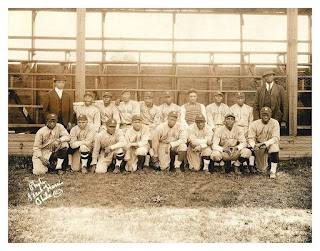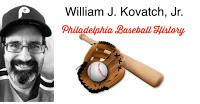The Hilldale Ball Club of Darby, PA
Beginning
with Octavius Catto and Jacob White of the Philadelphia Pythians, the City of
Brotherly Love played a large role in the development of African-American baseball.
The origins of several talented African-American teams include ties to the Philadelphia
area, such as the Cuban Giants, and the Philadelphia Giants. One such team that played in the early 20th Century was the Hilldale Club.
Hilldale
played in a city just southwest of Philadelphia, Darby, PA. The team had its roots in an athletic
association for young men, called the Hilldale Athletic Club, formed in 1910. Ed
Bolden, who worked in the main branch of the Philadelphia Post Office, founded
the club, and had Hilldale Park built in 1914 at Chester and Cedar Avenues in
Darby. Bolden eventually incorporated the
team in 1916 as the “Hilldale Baseball and Exhibition Company,” and began
recruiting top African-American baseball players.
Hilldale
had no official nickname, and was mostly referred to as Hilldale or the Hilldales. Informally, the team was also called the
Hilldale Daisies, the Darby Daisies, Clan Darby and the Hilldale Giants.
On
February 13, 1920, the Hilldale Club was among the teams represented in Kansas
City to follow Rube Foster’s lead in forming the Negro National League. Hilldale, however, only played in that league
in 1920 and 1921.
In
1923, Hilldale was one of the founding members of the Eastern Colored League,
and won the league’s pennant in 1923 through 1925. While Rube Foster was
annoyed with the Eastern Colored League for raiding his Negro National League
for players, he recognized the value of cooperation. Much like the National and
American Leagues had formed a truce in 1901 and started playing the World
Series, the Negro National League and the Eastern Colored League began sending
their leagues’ pennant winners to play each other in an end of season series, called
the Colored World Series in 1924. The Colored World Series was a best of nine
playoff. From 1924 through 1926, Philadelphia’s Baker Bowl served as the host
of some of the Colored World Series Games.
1924
saw the Hilldale, winner of the Eastern Colored League pennant, play the Negro
National League champions, the Kansas City Monarchs. The Series was close, with
two extra inning games including one tie when game three was called in the
thirteenth inning due to darkness. In
the end, Kansas City edged out Hilldale five games to four.
Hilldale
and Kansas City returned for a rematch in the 1925 Colored World Series. This
time, Hilldale bested the Monarchs five games to one.
Bolden
grew frustrated by the disorganization of the Eastern Colored League, and
pulled his team out in 1928. Hilldale joined the American Negro League in
1929. But that league lasted only one
season. After the 1929 season, the Great Depression hit the African-American
community hard, with an unemployment rate reaching as high as 50%. A number of Negro League teams suffered due
to a downturn in attendance. Hilldale was no exception. Financial hardship
forced the team to fold in 1932.
Nonetheless,
Hilldale had a proud legacy in the history of the Negro Leagues. During the
Hilldale’s three pennant winning years, the team had three players who were eventually
inducted into the Hall of Fame. They were catchers Louis Santop and Biz Mackey,
and third baseman Judy Johnson. Other Hall of Famers who played for Hilldale
include Pop Lloyd, Martin Dihigo and Oscar Charlton. On October 14,
2006, the Commonwealth of Pennsylvania dedicated a historical marker to honor
the location of Hilldale Park.
References
Hackney,
Suzette, "Big-league Baseball Once Drew Crowds In This Suburb Darby
Borough Was The Home Of The Hilldale Club Of The Former Negro League. The Team
Won A Title In 1925," philly.com (February 12, 1995).
Heaphy,
Leslie A., The Negro Leagues, 1869-1960 (McFarland & Company: 2003).
"Hilldale Daisies," Negro Leagues Baseball Museum, eMuseum (http://nlbemuseum.com/history/teams/hilldalegiants.html).
Threston,
Christopher, The Integration of Baseball in Philadelphia (McFarland &
Company: 2003).



Comments
Post a Comment